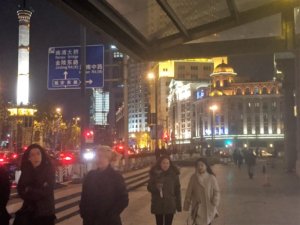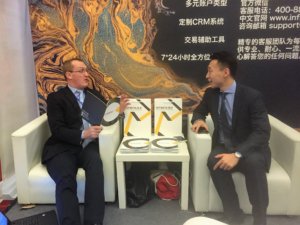IBs and the prime brokerage choice in China: Insight
“Today’s Chinese electronic trading ecosystem is a completely business to business world. It is a market driven by API clients, IBs, money managers and large brokerages. Nowadays, we have seen the transitioning of Chinese brokers from complete B book operations toward the standard model of brokerage connected to multiple liquidity sources”

The distribution of liquidity to retail FX brokerages has been a somewhat misunderstood cause to many institutional and retail participants in the free world wishing to gain a toehold in the indeterminable yet highly lucrative Chinese FX market.
According to the vast majority of brokerages in mainland China that have discussed this at length with FinanceFeeds, market execution and accurate pricing is paramount, and it is clear that there is a homogeneous commonality among Chinese portfolio managers, brokerages and large scale introducing brokers in the level of detailed understanding of the entire structure upon which the electronic financial markets system operates globally.
Between the non-Chinese world and China’s 1.4 billion highly educated population, many of whom are either employed by, or leaders of, all encompassing companies in all sectors which provide the entire world with everything from household goods to technology, is the world’s most sophisticated internet firewall.

A firewall that employs over 2 million government officials and filters absolutely every piece of data, every transaction and every commercial and private activity with the free market world has been the top consideration for many small to medium FX brokers over the last few years.
Simply receiving money from clients via various algorithmic payment channels, or forging remote relationships with introducing brokers has been a model employed for quite some time now, which is an absolute display of lack of ability to navigate the business environment in China.
Thus, there are two status quo situations that exist at the moment:
Firstly, the method by which Western firms establish a joint venture partnership with a Chinese entity, with sufficient government control and commercial interest in order to make the joint venture count as a Chinese company, completely hosted and operated from within China.
Many western prime brokerages operate this model and provide service to Chinese IBs and brokerages across the country. This enables Chinese brokerages to access global liquidity on an aggregated, multi-source basis and is one of the main reasons why so many brokerages and IBs the length and breadth of the land favor companies such as FXCM, Saxo Bank, Advanced Markets and GAIN Capital as partners.

These companies operate Chinese-centric offices and have that ability to distribute bank and non-bank liquidity via Tier 1 interbank partners in London, as well as electronic communication networks which consist of non-bank counterparties such as Hotspot FX, XTX Markets, Citadel Securities, FXall and Currenex.
It would be extremely foolhardy to assume that, despite the impenetrable firewall and continual government interference, Chinese IBs and brokerages do not understand how these companies aggregate liquidity or what the quality of it is in terms of pricing and execution. They all do, very clearly indeed.
The second method, which is about to absolutely mushroom is the Chinese domestic banking system’s market liquidity extension to OTC derivatives firms.
The advantage that this has is that there is a uniformity throughout the entire component system from bank to prime brokerage, to brokerage and risk manager. The entire set of firms that provide each are overseen by the government, (in most cases partially owned by the government), and would operate in a ‘hewn from granite’ fashion rather than as a set of separate solutions, and would be inside the firewall that protects the most enormous and highly educated retail and institutional market in the world, thus no barriers would be present.
Chinese banks and primes are not weary or risk averse as is the case in many other parts of the world. They are a government backed powerhouse with enormous purchasing power and are not subject to risks or damage factors from other parts of the world that are outside their control. Simply, they control everything.

The less desirable aspect of this is that there is a rigid structure which cannot be circumvented or tailored to suit any specific purpose that a brokerage may wish to adapt to in order to look after the requirements of specific clients, or to give an edge in terms of value proposition.
Attempts to internalize the entire industry by the Chinese government have coincided with the decision by the People’s Bank of China, which owns the state regulatory authority for FX, and in turn is owned by the government, to rule that any entity or individual sending money abroad to a value greater than $50,000 must now sign to state its purpose before a transfer is made, and if it is for securities trading (and online FX is included in that), then this is not legal.
Given the nature of the level of obedience, it is highly unlikely that anyone will attempt to make a false declaration, however there are other methods.
Naomi Ewart-Simcock, head of the Chinese desk at AFX Capital in London is an expert in doing business with Chinese IBs.
“As usual, the Chinese government’s announcement with regard to blocking transfers to FX firm is as ambiguous as always” Ms. Ewart-Simcock explained to FinanceFeeds today.
“While the state-run banks are tightening their grips, the 3rd party payment platforms’ business soars. Here are the names stand out: Safecharge and China UnionPay (bfopay). The demand for FX trading is spreading rapidly from major cities like Shanghai and Beijing to second tier cities like Zhengzhou, Hangzhou and Shenzhen regardless what the government’s guide line is” – Naomi Ewart-Simcock, AFX Group
Ms. Ewart-Simcock continued to explain “Also, the People’s Bank of China’s decision on this actually made FCA licensed firms are ever desirable. Indeed, the government frowns upon FX trading or wiring money abroad. ‘Your money is not protected by us, but will be protected by reputable foreign regulators nonetheless’ – it looks like is what the government really wanted to say” she said.
“The enquiries that I have received increased since the announcement have quite often involved clients asking me ‘do you have the 3rd party payment system to accept funds?’ ‘Of course we do, it is a must’ I would answer.” – Naomi Ewart-Simcock, AFX Group
In Shanghai last week, FinanceFeeds met with fluent Chinese-speaker Pavel Khizhnyak, CEO & Founder, Trade Exact, who explained to FinanceFeeds “The patience of many Chinese IBs is very thin and competition is very tough. You have a very short time to get the decision before they go elsewhere”.
“This happens so quickly that by the time the CEO of the brokerage whose sales team struck a deal with an IB in China wakes up, the client has already opened an IB account elsewhere and several trading accounts are up and running” – Pavel Khizhnyak, CEO & Founder, Trade Exact.
Another aspect is the Chinese respect for correct and proper business conduct, hence the understanding of regulation in different regions is very comprehensive among Chinese participants, according to Mr. Khizhnyak.
“Chinese clients are much more aware of regulation than people in other regions, for example in Russia, and are very perfectionistic” he said.
“Today’s Chinese electronic trading ecosystem is a completely business to business world. It is a market driven by API clients, IBs, money managers and large brokerages. Nowadays, we have seen the transitioning of Chinese brokers from complete B book operations toward the standard model of brokerage connected to multiple liquidity sources, that can accept different types of clients and can STP the order flow” – Pavel Khizhnyak, CEO & Founder, Trade Exact
….and they are not always using Chinese LPs either.
“Think of it this way” enthused Mr. Khizhnyak. “I recently discovered that there are more than 1000 municipal exchanges in China, sometimes several in one city. The word ‘exchange’ is used, however these are effectively similar to small warehouse brokerages because they do not have any external liquidity and trade against their clients.”
“This is absolutely contrary to the US where you have around 4 major exchanges and everything is transparent, hence the demand for proper execution and the Chinese IBs and brokerages’ unrelenting quest to find it and work properly with it is very much a major component of the business” he said.

Enthusiastically, Mr. Khizhnyak, echoing a tremendous amount of enthusiasm for a high quality and exponentially growing FX industry in China, explained “The market is growing, and there is a massive demand for professional liquidity and for brokers that are committed to moving the market on.”
On the other hand, Kevin Wang, Head of Asia Pacific at British retail brokerage INFINOX maintains that it is not possible for any British brokerage to host every aspect of its operations in China.
Mr. Wang said on this subject “It is most certainly not convenient for us having to adhere to new rules, however anyone wishing to transfer client funds from a Chinese entity of a brokerage, or representative office, into a British parent company will have to do so via a third party.”
“We cannot allow local clients to transfer to a local bank because of FCA rules on client assets. The clients have to transfer to British bank. If transferring to local bank in the way that Chinese brokerages or Western brokerages that have a full Chinese venture do, a lot more business is possible because there are no restrictions on capital flow, however from our point of view, the FCA regulation is paramount to attract a good client base as it is highly recognized” – Kevin Wang, Head of Asia Pacific, INFINOX
Mr. Wang said that the new capital control laws are infliuening the whole industry especially the internal brokers in China. They need to have the correct channel to transfer the funds on time securely if working with overseas entities.
Reiterating the view that Chinese customers are insistent on having access to genuine market liquidity, Mr. Wang explained that INFINOX has prime brokerage agreements with two Tier 1 banks, as well as aggregated feeds from major non-bank electronic communication networks including FXall, Currenex, and EBS.
These are features which will be of vital importance in future as Chinese customers are highly enlightened when it comes to where their trades are being executed, and are intolerant of warehouse brokerages purporting to be able to execute in a live market, once again highlighting the attactiveness of operating with overseas companies with good provenance.
Meeting with Advanced Markets’ and Fortex’s Natallia Hunik in Boston, Massachusetts at the end of last month, we specifically discussed prime of prime services in China. At that time, FinanceFeeds had conducted a vast amount of research in China, and one dynamic, considered among Chinese firms, to be a potential catalyst in changing the entire framework a year ago, was that the Chinese government, rather than issuing a regulatory license to FX brokers (which will never happen), may begin ensuring that all FX is conducted via banks.
By doing this, the government could control the entire system, and have ownership for all accounts, and retail traders would be forced to trade with the bank that they have their day-to-day bank accounts with. We asked many brokers if they intended to look at hedging their bets and partnering with Chinese banks and most said no.
“We are very well positioned to go that route but, at the moment, we are discussing opportunities with local Chinese exchanges rather than banks. It’s true that the existing exchange platforms may be very old and not at all appealing to the younger trader but, if you are sophisticated enough, then you can partner with the exchanges in order to provide trading facilities while, at the same time, utilizing technology such as ours to give the traders the type of access they desire” said Ms. Hunik at the time.

As Ms. Hunik explained to FinanceFeeds at today’s meeting “Chinese exchanges, mainly precious metals ones, are still looking at updating their platforms in order to bring them up to the modern standard. Fortex is striving in this area and our proprietary Fortex 5 and Fortex 6 platforms are well-positioned to service, even, the most sophisticated users whilst also supporting algo trading, allowing traders to script their own strategies in C# and Javascript”.
“Another major trend we are observing in Chinese market is that Chinese brokerages are becoming more sophisticated in what they are demanding from prime brokerages, and are looking forward toward expanding to become B2B providers in their own right, they want to sign up their own white labels.”
FinanceFeeds concurs that indeed, partnering with government-owned institutions for liquidity is a long term exercise that has yet to prove its feasibility, something that Advanced Markets agrees with. “Since government ownership involved, very few non-Chinese entities can engage in any joint ventures or mergers with, or consider any acquisitions of, Chinese institutions” said Ms. Hunik.
“For example, Blackwell Global is a prime of prime in China, and has been expanding its services from retail FX into a firm that offers institutional services within China” she said.
And indeed, Blackwell Global is a case in point. Today, FinanceFeeds picked this up with Jean-Raphael Nahas, Business Development Manager at Blackwell Global.
Mr. Nahas explained “I am not sure that there is such thing as truely accessible Chinese bank liquidity. Currently Chinese banks do not quote price. Brokers who do not have Europe offices are still able to gain access to Tier 1 banks liquidity.”
“Aside from that, I think that having presence in Europe and Asia enables Blackwell Global to gain access to diversify flows in order to provide a comprehensive liquidity solution to our partners in China, which make up a very large proportion of our core business” said Mr. Nahas.
The commonality here is that all of the companies that fully understand the paradox between the Free Market world and China are those who have actually established operations in the mainland and conduct business truly internationally, from both sides of the firewall. QED.
Image: The Bund, Shanghai. Copyright FinanceFeeds









